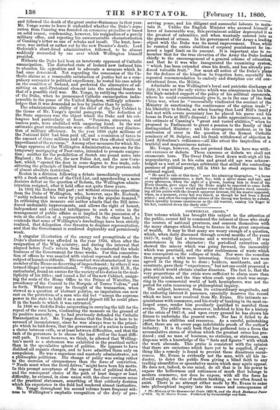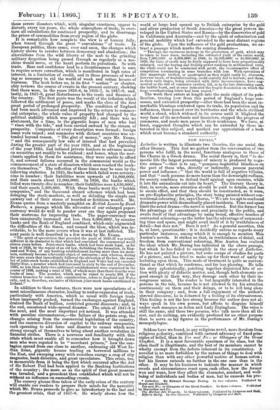COMMERCIAL MISES. * THE volume which has brought this subject to
the attention of the public, cannot fail to command the interest of those who study the sources of national greatness, and concern themselves with the many changes which belong to finance in the great emporium of wealth. It may be that many are weary enough of a question, which, when daily discussed through several months of the years 1857-'8, really had a tiresome and a wretched aspect. It was monotonous in its character ; the periodical narratives only showed the misery, which was going forward, the immorality which was practised, and the utter recklessness of waste which was consequent on the collapse of trade. Nor were the remedies then proposed a whit more interesting. Scarcely two men were agreed in the thing to be done ; bankers, merchants, and ac- countants, gave their " experiences," but not one could propound a plan which would obviate similar disasters. The fact is, that the very proportions of the crisis were sufficient to alarm more than ordinary minds, and the time when crash upon crash was occur- ring in the commercial world of both hemispheres, was not the period for calm reasoning or philosophical inquiry. The subject, however, from its extraordinary magnitude, and the enduring interest it possesses, especially deserves the record which we have now received from Mr. Evans. His intimate ac- quaintance with commerce, and his study of banking in its most en- larged sense, render him peculiarly qualified to marshal these events. The public were, moreover, indebted to him for a histoiy of the crisis of 1847-8, and upon every ground he has shown his fitness to undertake the present work. Nor has it failed to do justice to his abilities and resources. As a careful, painstaking effort, there are on every page indubitable proofs of the author's industry. It is the only book that has gathered into a focus the accumulative stores of wisdom which the greatest crises has pro- duced ; and no man of business, no statician, or statesman, can dispense with a knowledge of the " facts and figures " with which the work abounds. This praise is consistent with the opinion that there are omissions which have yet to be supplied, if any- thing like a remedy is found to prevent these disastrous mow- rences. Mr. Evans is evidently not the man, with all his in- dustry, to deter the public from giving a blind faith to any trading absurdities or speculative mania which may again appear. He does not, indeed, to our mind, do all that is in his power to expose the hollowness and rottenness of much that belongs to modern commerce, nor does he expose, with all the force he should employ, the vice of modern banking, as too often found to exist. There is no attempt either made by Mr. Evans to enter into philosophical inquiry into the causes and consequences of • The History of the Commercial Crisis 1857-'8, and the Stook Exchange Tani* of 1859. By D. Movies Evans. Published by Groombridge and sons.
these severe disasters which, with singular exactness, appear to disturb, every ten years, the whole atmosphere of trade, to over- turn all calculations for continued prosperity, and to disarrange the prices of commodities from every region of tho globe.
It is remarkable how complete the view is of human folly, when traced through the great " convulsions " of trade. In European politics, there oome, ever and anon, the changes which history shows to revolve between democracy and absolutism ; the alternations from the wild liberty of the mob to the grinding military despotism being passed through as regularly as a ma- chine would move, or the heart perform its pulsations. So with trade. Ease and confidence lead to a licentiousness that is sure to require severe correction, which is manifested in high rates of interest, in a limitation of credit, and in those processes of weed- ing so necessary to rid the world of weak and rotten houses of business. The book before us, in its first " section" or chapter, ably reviews the course of events in the present century, showing that there were, in the years 1825-6, in 1836-7, in 1847-8, and, lastly, in 1857-8, great disturbances to the trade and finances of the country. The first panic was the result of the inflation which followed the settlement of peace, and marks the close of the first great period of prolonged prosperity. The condition of England had been much advanced and improved by the return to commer- cial enterprise ; the whole value of property had changed by the political stability which was generally felt ; and there was no abatement, for a time, to the gigantic hopes of men who had " risen with the tide," and been carried onward by the stream of prosperity. Companies of every description were formed; foreign loans were raised; and commerce with distant countries was ex- tended beyond reason. " The glut of money," says Mr. Evans, " and the consequently low rate of interest that had prevailed during the greater part of the year 1824, and at the beginning of the year 1825, had induced private bankers to advance money on securities not readily to be realized ; and hence, when the mer- chants applied to them for assistance, they were unable to afford. it, and several failures occurred in ihe commercial world as the commencement of a state of disasters which soon reached the bank- ers themselves." The reflection of these times may be seen by the following statistics. In 1825, the banks which failed were seventy- nine in number; their liabilities were upwards of 14,000,0001. and their assets about 11,000,000/. In 1826, the banks which failed were twenty-five in number; their liabilities were 4,650,0001., and their assets 3,300,000. With these banks went the "bubble companies," and the thousand absurd schemes which had been deluging the stock-markets, as well as deluding the simple and unwary out of their stores of hoarded or fictitious wealth. Mr. Evans quotes from a masterly pamphlet on British Losses by Bank Failures, a passage which the advocates of our enlarged paper- currency would do well to .ponder over ere they again propound their nostrums for improving trade. The paper-currency was then unnaturally increased not less than 8,000,000/., by country banks and the Bank of England combined, which only augmented the difficulties of the times, and caused the blow, which was in- evitable, to be the more severe when it was at laseinflicted. The next panic is well described in a few words by Mr. Evans. "The spirit of speculation that preceded the panic of 1836-37 was totally different in its character to that which had convulsed the commercial world eleven years before. Joint-stock banks, which had been made legal, as far back as 1826, by the repeal of an old law, forbidding the formation, in Eng- land and Wales, of any banking establishment having more than six mem- bers, suddenly became a favourite object of enterprise ; and, whereas, during the same years that immediately followed the alteration of the law, the num- ber of joint-stock banks established in England and Wales had not exceeded thirty-four, a number which had increased to sixty by the end of December, 1835, no less than forty-two additional establishments were organized in the course of 1836, making a total of 102, of which more than three-fourths were banks of issue. The number, which may be raised to nearly 200, if the various branches be taken into consideration, refers to England and Wales only, and is, therefore, exclusive of thirteen joint-stock banks established in Ireland."
In addition to these features, there were new speculations of a most miscellaneous character, leading to undue expansion of trade, particularly with America, which as usual with foreign trade when improperly pushed, turned the exchanges against England, drained the Bank of bullion, restricted general discounts ; and, in the end, occasioned wide-spread disaster. The crisis of 1847-8 is the next, and the moat important yet noticed. It was attended with peculiar circumstances,—the failure of the potato crop, the changes arising from the commercial legislation of the country, and the enormous diversion of capital to the railway companies, each operating to add force and disaster to causes which were strong enough of themselves to bring about another revolution in financial circles. There is a nearness and familiarity with this crisis which must enable all to remember how it brought down men who were reputed to be " merchant princes," how the con- tagion spread from one class to another, embracing old West In- dian firms, gigantic houses trading on borrowed millions to the East, and sweeping away with resistless energy a crop of city magnates, bank directors, and great speculators. This crisis, too, is memorable from it being the first which occurred after the Act of Sir Robert Peel had been applied to the Banking Institutions of the country; the more so as the spirit of that great measure was invaded, and a precedent then established which will not be without an influence on succeeding events.
The cursory glance thus taken of the early crises of the century will enable our readers to prepare their minds for the narrative which Mr. Evans proceeds to give as introductory to the last and the greatest crisis, that' of 1857-8. He wisely shows how the
world at large had opened up to British enterprise by the gold and silver production of South America—by the great powers de- veloped in the United States and Russia—by the discoveries of gold in California and Australia—and by the spirit of colonization and general mobility which had extended to the most distant regions of the globe. Upon the influence of the gold productions, we ex- tract a passage which marks the coming disasters- " Through the enormous increase in the production of gold, which may be taken to have risen, including the estimated yield of the entire world, from 7,000,0001. or 8000,0001. in 1849, to 34,000,000/. or 35,000,0001. in 1858, the basis of credit may be fairly supposed to have been proportionably enlarged, and the buying and dealing power ranking in arithmetical ratio, the whole could not be conducted with profit, the counteractive effect of competition terminating in some branches with loss. With operations of this magnitude trebled, or quadrupled as they might easily be, elements, however small, of doubtful trading, could scarcely fail to intrude, and these, in their early stages, being attended with little inconvenience, have aug- mented as the tide of commerce swelled, till, as in the late distressing eases, the bubble burst, and at once indicated the fragile foundation on which the huge overshadowing fabric had been reared."
The work then enters at length into the main object of its pub- lication, tracing how from this period of England's huge suc- cesses, and extended prosperity—after there had been the most re- markable blessings conferred upon its trade, its population and its influences, there passed over its territories and the whole civilized world a cloud, which widened in its course until it blighted the very fame of its merchants and financiers, stopped the progress of commerce, and made men pause in their confidence. We have, at least, suggested thoughts which can be extended by those in- terested in this subject, and marked our appreciation of a book which must become a standard authority.































 Previous page
Previous page